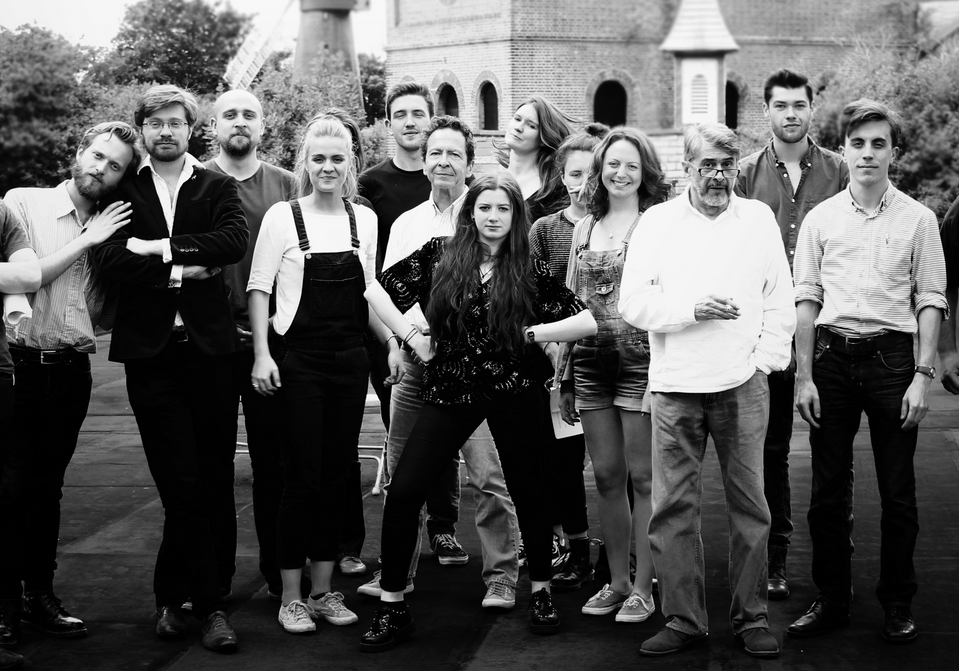Wooden Overcoats is one of the best British comedies in years. But it doesn’t involve Simon Pegg and Edgar Wright. You won’t find it playing in a movie theater or streaming through Netflix. This is distinguished, sometimes eccentric, and frequently hilarious comedy carefully honed for the ear, a production that is both of our podcasting age and that naturally jumps off from Spike Mulligan and Peter Sellers’s goofy radio experimentation.
Telling the tale of two rival funeral homes competing for business on a mile-wide island of Piffling (a forgotten strip in the Channel Islands), with embittered local Rudyard Funn (“displaying the athleticism that comes only to a man whose entire fortunes rest on burying a seagull before six o’clock”) brushing up against a dashing new mortuary upstart named Eric Chapman, the listener is immediately struck by how fresh, original, ambitious, and committed this show feels. The story is narrated by a memoir-writing mouse, for one thing, voiced by veteran actor Belinda Lang. Amazingly, the show was produced entirely independent. The scripts were so good that the crew behind this massive operation not only persuaded veteran actors and nimble newcomers alike to work for nearly nothing. They even assembled a small orchestra to record the show’s theme.
Last September, Wooden Overcoats unveiled its first season of eight episodes. While this seemingly out of nowhere release earned deservedly rapturous praise from many in the audio drama community, it remains a great mystery why this wonderful and truly sui generis production hasn’t been more passionately endorsed by those who profess to know all culture. In addition to being terribly funny, Wooden Overcoats is also highly accomplished audio drama with energetic voice work and nimble effects and a meticulously timed pace. It is the kind of program that might never have found support within the limited ambitions of current media institutions.
Of course, Wooden Overcoats isn’t done by a long shot. It is now in the middle of a Kickstarter campaign to raise funds for its second season, but it needs listener support. It is presently just a few thousand pounds (and a few thousand George Washingtons) away from being able to do this.
Within minutes of listening to Wooden Overcoats‘s first episode, I suspected that the program had been put together with a great deal of thought, care, and attention. After I plunged into this magnificent show, discovering that I could not stop listening, I contacted head writer David K. Barnes and actor Felix Trench (who plays Rudyard) to find out just how this show was made. These two affable gents responded to my many questions. And we fell into a two week frenzy of perspicacious banter, which has been presented below.
You can listen to the show here. You can contribute to the Kickstarter campaign here.
EDWARD CHAMPION: Aside from the sheer fun I had binge-listening to the entire first season in less than 24 hours, there were a number of curious qualities that I noticed about Wooden Overcoats. There’s a certain cultural history of narratives set on islands, ranging from Daniel DeFoe’s Robinson Crusoe to Muriel Spark’s woefully underrated novel Robinson (of which Wooden Overcoats suggested close associations!), to the islands that populate David Mitchell’s novels, to Gilligan’s Island and Lost and the beautifully nutty 1973 film The Wicker Man. In all of these examples (and even Sherwood Schwartz populated his island with an eccentric ensemble!), the island’s geographical limitations somehow provided their creators with a kind of license to go big, whether it meant a labyrinthine plot or an allegory or an exploration of strange behavior. I’m wondering how your own island came about. Did you consider other island narratives before making this? Why did you feel that radio was the best way to tell this story?
DAVID K. BARNES: We started with the basic premise of two competing funeral directors and knew that they’d have to be in a small community for the comedy to work. I decided very early on whilst plotting the first episode that it’d be best if Rudyard had lived in this community all his life and that Eric was brand new, arriving in that episode, and that the power struggle would be essentially one-sided. A village on the mainland seemed to me to provide too many avenues of escape — Rudyard could essentially move, if his pride would let him — and so we thought setting the series on an island would isolate everybody and raise the stakes.
Though I’ve read Robinson Crusoe and seen The Wicker Man and so on, I can’t say I was inspired by any of them, though I am generally very interested in the history of tiny islands and countries. Small communities developing their own traditions and taking whatever they want from the culture of the outside world… I was also born and raised in Portsmouth, UK, which is an island steeped in naval history. Quite honestly, however, very little of all this is reflected in Wooden Overcoats!
FELIX TRENCH: I’ve listened to radio comedy since I was a teenager; I suspect that’s the same for a lot of us who get into it. I grew up in mainland Europe and an abiding memory is staticy BBC Radio 4 LW fading Dead Ringers in and out as we waited for the lights to turn green.
I began Audioscribble with a couple of other actors in 2012 (in a graveyard weirdly) as a way to make work for ourselves in a medium we love but has few openings. There’s a long tradition in comedy of starting out on the radio and coming back to it (like Mitchell and Webb did recently or Stephen Fry’s series on etymology). Having a state broadcaster like the BBC who run much of the most listened to/watched radio and TV and make their own content probably has something to do with that. It never occurred to me that we’d do it another way.
CHAMPION: What accounts for some of the unusual mathematical factors (a mouse tells the story — a very small being; two competing funeral parlors)? Do you feel that scope inevitability arises from creative limitations?
 BARNES: It’s usually a function of storytelling. There are two competing funeral parlours because three would dilute the impact of the narratives and characters. The island has one of everything because then you can keep going back to those locations and develop recurring characters. The narrator being a mouse arose from the fact that when writing the first episode I wanted to tie the narrator into the action, and felt that the episode needed to end on a twist that would intrigue the audience enough to listen to Episode 2. I’d early on established that Rudyard’s only friend was a mouse and then thought, well, why not make the mouse narrate the show? A mouse can observe everything without being observed itself! And she’s writing a memoir for commercial gain, which explains why she’s (a) telling us all this, and (b) telling us only the “good bits”. Almost everything that happens in WO is a result of a carefully decided plan on how best to tell the story in an involving and entertaining way.
BARNES: It’s usually a function of storytelling. There are two competing funeral parlours because three would dilute the impact of the narratives and characters. The island has one of everything because then you can keep going back to those locations and develop recurring characters. The narrator being a mouse arose from the fact that when writing the first episode I wanted to tie the narrator into the action, and felt that the episode needed to end on a twist that would intrigue the audience enough to listen to Episode 2. I’d early on established that Rudyard’s only friend was a mouse and then thought, well, why not make the mouse narrate the show? A mouse can observe everything without being observed itself! And she’s writing a memoir for commercial gain, which explains why she’s (a) telling us all this, and (b) telling us only the “good bits”. Almost everything that happens in WO is a result of a carefully decided plan on how best to tell the story in an involving and entertaining way.
TRENCH: Limits are amazing. They force you to focus on story which is the most important thing. In Season 1, David purposefully looked for writers for the team who had a background in playwrighting knowing that he could add the jokes later if needed. Giving yourself a limit (or even better having someone give it to you) pulls you out of the patterns you’re comfortable with and makes you think in ways that you wouldn’t have before. I’ve worked as an actor both on roles I’ve written and roles I haven’t and I vastly prefer the latter – it’s more satisfying to look for a way into someone else’s mind than roll around in your own. The pitching process to the usual radio channels in this country recently became a lot harder to break into which is what ultimately forced us to gamble on podcasting.
CHAMPION: Did such a mantra extend to some off the writing (such as many of the seaside adventures)? Also, just how in the sam hill did you two goofy fellows hook up for this?
 BARNES: There’s certainly a lot you can do with audio. There are huge sequences in some of our episodes which would be very expensive to film as television, and tricky to do on stage (the flooded mortuary swimming in corpses, Rudyard’s clifftop excursion…). So, as long as we can effectively communicate what’s happening to the audience, we like to try out a few big set pieces. Also, the idea that the island is a mile wide and yet has all these things on it is conceptually very interesting and ridiculous in a way I think is best suited for audio. You couldn’t visualise it on TV, and in written prose you’d probably notice how improbable it was. On audio you kind of go along with it. I told my writers to establish whatever they wanted on the island because Piffling could certainly accommodate it.
BARNES: There’s certainly a lot you can do with audio. There are huge sequences in some of our episodes which would be very expensive to film as television, and tricky to do on stage (the flooded mortuary swimming in corpses, Rudyard’s clifftop excursion…). So, as long as we can effectively communicate what’s happening to the audience, we like to try out a few big set pieces. Also, the idea that the island is a mile wide and yet has all these things on it is conceptually very interesting and ridiculous in a way I think is best suited for audio. You couldn’t visualise it on TV, and in written prose you’d probably notice how improbable it was. On audio you kind of go along with it. I told my writers to establish whatever they wanted on the island because Piffling could certainly accommodate it.
TRENCH: David and I have known each other since 2006. We were both studying at Edinburgh, along with our production manager, Liz. I graduated the year before them and moved to London and, long story short, we all ended up living together. I met Tom Crowley on a playwrighting course in 2012 and he and I have worked on projects together ever since. We’ve often noted how our careers tend to parallel each other’s and we’ve ended up in the same spot from different performance backgrounds. I initially pitched to him a short film about rival undertakers for us both to work on/be in and we made some plans but never followed through. Six months later, we revived the idea as an audio sitcom and brought it to David as a concept. He disappeared for twenty minutes then came back with a treatment for episode 1, I had a quiet word with Tom, and we asked if he’d like to run the show. I’d worked with David on a couple of other projects before — including an audio comedy — and knew that whatever he’d do, it would be good.
CHAMPION: Wooden Overcoats has this interesting tension between a bustling cadre of characters and the inherent limitations of a small community. Given the intimacy of the medium, how ambitious do you think audio drama can be in sustaining an epic scope? As you point out, you can certainly stage epic incidents, such as flooded mortuaries.
TRENCH: Radio 4 adapted Neverwhere recently, Naxos gave us a Michael Sheen-led Sophocles cycle, there was a big Lord of the Rings adaptation in the early 80s, Hitchhiker’s crossed the axes of time, space and probability, and just last year we had all the John Le Carré Smiley books so… pretty ambitious. I think the size is in the storytelling choices. Radio is well-suited, as you say, to intimate because you’re talking in somebody’s ear. You’ve got a different set of toys at the IMAX, different again at the theatre. There’s a truism in acting that goes something like “play the size of the room, not the size you want to play”. Radio is to an audience of one which is strange in any other medium (I think, I can’t think of any examples right now) so it’s up to us as creators to create that sense of the epic, if that’s what we’re going for, for a single audience. I think who that audience of one is is changing though. There is a difference between listening to the Afternoon Play while chopping vegetables and listening to Night Vale while curled up in bed or on the tube. If I tell you a story from three feet away, it’s different to if I tell it in your ear. The current wave of podcast dramas are even more direct than what we’re used to — probably more so than ours which takes a very traditional approach but adds in the Madeleine narration to tie us to the podcasting world.
CHAMPION: During the writing, the pragmatics of production, or the jarring discoveries in post-production, have you run into any hurdles that have caused you to scale back in any way?
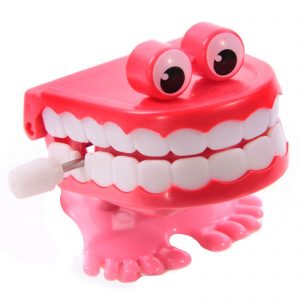 TRENCH: Not yet! David’s a good enough writer not to demand the impossible and the producers are good enough producers to provide the impossible anyway. We were constantly surprised listening to Season 1 how much detail they’d put in. There’s a moment in Episode 4 where Madeleine is chased by a clockwork toy which you only catch if you listen carefully, Antigone’s survival suit became a full on 60s cosmonaut’s outfit, and our composer provided specific background music for the big set pieces.
TRENCH: Not yet! David’s a good enough writer not to demand the impossible and the producers are good enough producers to provide the impossible anyway. We were constantly surprised listening to Season 1 how much detail they’d put in. There’s a moment in Episode 4 where Madeleine is chased by a clockwork toy which you only catch if you listen carefully, Antigone’s survival suit became a full on 60s cosmonaut’s outfit, and our composer provided specific background music for the big set pieces.
CHAMPION: I also noticed that, in your Kickstarter campaign, you’ve invited your supporters to devise a creative form of death. To what degree are you beholden to entertaining an audience? In what creative ways do you diverge from this?
BARNES: I’d say that we’re entirely beholden to entertaining our audiences. However, the best way of doing that is to create what we personally believe is an entertaining programme and hope that our audiences enjoy it too. I tend to write my scripts with a view to thinking up a dramatic and/or amusing situation, and then going, “If I were in the audience, what would I want to see?” And then once I’ve come up with a few scenes on that principle, I finish with, “How can I put a twist on this that they wouldn’t have imagined themselves?” I think that’s the way to satisfy your audience, hold their attention, and keep them wanting more.
I have known writers who entirely disregard their audiences, which I think is arrogant and foolish. Your audience buys tickets to your shows — or downloads your podcast — and recommends you to their family and friends. You’ve got to provide them with something worth their while, or they’ll find it elsewhere. But equally, the old maxim that “people don’t know what they want until they’ve got it” holds true. We all enjoy getting some more of the same but we tire of it very quickly. It’s why I like having guest writers on the series: not only does it take some of the pressure off me, but they also come up with fresh ideas and perspectives that I’d never have come up with by myself, which reinvigorates the series.
I think it’s the dramatic qualities of the show which keep our audiences listening and re-listening. When I delivered the “Bane of Rudyard” script to my directors and was asked to produce another seven, they said they wanted to do this show in the studio rather than in front of a live audience. They wanted me to explore the dramatic potential of the characters and situations without having to flood the series with one-liner gags (which can make a comedy sound superficial unless the writing is exceptionally sharp).
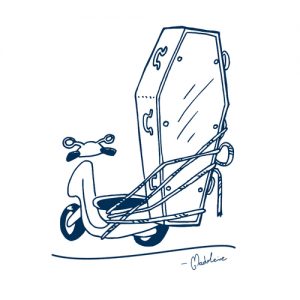 As Felix mentioned above, I tend to approach writers from theatrical backgrounds like myself. Not all of them had even written comedy before but they all had superb instincts for creating dramatic situations. I said to them, “Don’t concentrate on being funny, whatever you do. Let your imagination run free, and focus on being interesting.” It doesn’t take a great deal of work to take something serious and make it amusing (or the other way around). My favourite episode to write in the first season was “Georgina and the Waves,” in which one of the silliest situations of the series evoked some of the most wrenching character drama, and still managed to be — I think — very funny. In this respect, I’m heavily influenced by Alan Ayckbourn’s The Crafty Art of Playmaking, an essential read for any writer.
As Felix mentioned above, I tend to approach writers from theatrical backgrounds like myself. Not all of them had even written comedy before but they all had superb instincts for creating dramatic situations. I said to them, “Don’t concentrate on being funny, whatever you do. Let your imagination run free, and focus on being interesting.” It doesn’t take a great deal of work to take something serious and make it amusing (or the other way around). My favourite episode to write in the first season was “Georgina and the Waves,” in which one of the silliest situations of the series evoked some of the most wrenching character drama, and still managed to be — I think — very funny. In this respect, I’m heavily influenced by Alan Ayckbourn’s The Crafty Art of Playmaking, an essential read for any writer.
From the feedback I’ve read, our audiences have really taken our characters to heart, and I believe that’s because whilst Rudyard and Antigone etc. are ridiculous, they’re also based in something very real. They’re hurt and ennobled and motivated by the same things we are. They never do anything just to make the audience laugh, yet I think they’re very funny characters all the same.
CHAMPION: Since we’re on the subject of ambition, I am curious if the large cast was always part of the plan. Was your approach simply to create a fun story and figure out how to attract high caliber talent (along with figuring out their schedules) in the act of production?
TRENCH: We always knew we could get highly talented writers and actors because London is brimming with them. There’s a real problem here, like in other big creative cities, of the opportunities being scarcer than the workforce. We owe a lot to Max Tyler, Sarah Burton, Peter Wicks, Pip Gladwin, and Holly Campbell who play many of our islanders and smaller roles throughout the series, or help out at live shows when the series actors can’t make it, and are all brilliant.
Bringing in producers Andy [Goddard] and John [Wakefield] gave the project bigger scope than we had originally thought about. They introduced the ideas of full scoring and live instruments, episode guests on top of the regular company, and approaching a few household names.
CHAMPION: Did you have any narrow production scheduling confines that you had to meet (either out of necessity or self-imposed)?
TRENCH: Once the studio’s booked, those are your dates. It’s difficult to rearrange when you have a big team.
CHAMPION: it is my understanding that many of your actors worked for free. This leads me to wonder whether you forewent rehearsal and simply recorded the sides in the time slots that the actors available. (Obviously, any working actor is going to have to say yes to paid work first.) Is a quality script enough of an incentive for a talent to commit time and energy for a long-form production?
 TRENCH: All of our actors worked for expenses in Season 1 — we covered food and travel for the initial readthroughs and the recording. There was a lot of pizza. Rehearsals are unusual in radio, at least here they are. You’ll have the readthrough, maybe a few readthroughs if the script’s in development, and then perhaps a rehearsal before the take which will include a bit of blocking but it’s not like theatre. The whole process is closer to TV. We had a bit of flexibility with the recording process which gave us the luxury to record in sequence — which we did over four days. A couple of scenes had to be done out of order when guest’s schedules changed but not much. From an actor’s perspective, in sequence is amazing because you know exactly were you are in your mind at any one point and it’s easier to play the moment. As to the script, depends on the actor! The people who came on board with us did so because of the scripts.
TRENCH: All of our actors worked for expenses in Season 1 — we covered food and travel for the initial readthroughs and the recording. There was a lot of pizza. Rehearsals are unusual in radio, at least here they are. You’ll have the readthrough, maybe a few readthroughs if the script’s in development, and then perhaps a rehearsal before the take which will include a bit of blocking but it’s not like theatre. The whole process is closer to TV. We had a bit of flexibility with the recording process which gave us the luxury to record in sequence — which we did over four days. A couple of scenes had to be done out of order when guest’s schedules changed but not much. From an actor’s perspective, in sequence is amazing because you know exactly were you are in your mind at any one point and it’s easier to play the moment. As to the script, depends on the actor! The people who came on board with us did so because of the scripts.
CHAMPION: What deals did you have to cut to get people on board beyond this?
TRENCH: None that I know of. Maybe Andy secretly makes breakfast for the actors every morning. If he does, I want in.
CHAMPION: How many of the principals have pledged to return to the second season?
TRENCH: We haven’t yet reached the stage where an actor’s unavailability has led to re-writes, though I must always remain prepared for that being a potential issue until recording takes place.
BARNES: The scripts are still being written and cast requirements being drawn up, though those actors to whom we’ve already spoken about returning to Season Two have stated how keen they are to do it. Our four principals – Felix, Beth, Tom ,and Ciara – are certainly on board.
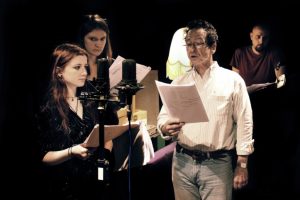 CHAMPION: Has actor availability forced you to alter any of the scripts (in either season)? I was also hoping to learn more about how David works with the other writers. What replaces a writer’s room in radio drama? Lots of Skype sessions? Emails? Dropbox and Facebook groups?
CHAMPION: Has actor availability forced you to alter any of the scripts (in either season)? I was also hoping to learn more about how David works with the other writers. What replaces a writer’s room in radio drama? Lots of Skype sessions? Emails? Dropbox and Facebook groups?
BARNES: All of my writers live in London, so it’s always feasible to meet them in person. However, they’re also all very busy, so it’s rare that I can get them into the same room at once. The pattern for Season One, which I repeated for Season Two, was to meet each writer individually to discuss the series, its characters, and any ideas they had. Then there’d be a meeting of the whole writing team — which, because of availability, is probably the only time we’ll be together in one place — during which everybody gives the broad outline of a few episode ideas. These are bounced around, discussed, and by the end of the meeting every writer has an idea that everybody is excited about. From then on, I keep in contact with each writer individually by e-mail or telephone.
My feedback on breakdowns and drafts is often extensive because I tend to know what I want from each episode once the writer has devised their idea. But the flip side is that I want to allow writers a lot of room to work by themselves the rest of the time; nobody likes somebody breathing down their neck when they’re trying to create!
CHAMPION: How much revision do you think is enough?
BARNES: Most problems with a story can be solved very early on at the scene-by-scene breakdown stage. That’s when you know if things don’t make sense, or an episode isn’t likely to be paced properly, or lead characters don’t have enough to do. If necessary, I’ll rework a writer’s breakdown myself and suggest that it’s probably a good compromise between their original idea and how it might be best deployed within the context of the show.
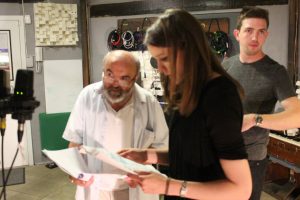 After that, the writers will do a first and then a second draft. I then take over, doing any necessary edits and re-writes. If the writer is happy with those, it goes to my producers for their opinion, and I may carry out additional edits based on their feedback. Then it goes to a full reading with available actors, with the writers and producers present, and a discussion will ensue. Any additional edits (usually very small by this stage) will occur before we get into studio to record. For Season One, I could count the number of lines that needed alteration in the studio on one hand, really. We really knock them into shape and ensure that everybody is happy.
After that, the writers will do a first and then a second draft. I then take over, doing any necessary edits and re-writes. If the writer is happy with those, it goes to my producers for their opinion, and I may carry out additional edits based on their feedback. Then it goes to a full reading with available actors, with the writers and producers present, and a discussion will ensue. Any additional edits (usually very small by this stage) will occur before we get into studio to record. For Season One, I could count the number of lines that needed alteration in the studio on one hand, really. We really knock them into shape and ensure that everybody is happy.
Generally, the more work put in earlier at the planning stage, the fewer headaches later on. When we did our Season One readthrough, it was a case of, “This particular line doesn’t work,” rather than, “This plot doesn’t work.”
CHAMPION: What mistakes do you feel you made during the first season? How do you keep the door open for continued “on the job” learning?
BARNES: Everybody was, as you say, learning on the job, so I’m sure everybody can point to things they’d do differently the next time round. The trick is to carry on doing the things that worked and to experiment to make them work even better! From a writing perspective, I’ve never been entirely happy with how the last episode devotes a considerable amount of the climax to the machinations of a secondary character; that was me trying to tie up as many plot threads as possible in too short a space of time. The production certainly pulls it off, but I should have found a more elegant solution at the time. I’m trying to pace things slightly better in Season 2, with the final episode placing the leads front and centre. Otherwise, for my first attempt at head writing and script editing an entire series, the whole thing went much more smoothly than I’d imagined!
CHAMPION: Audio drama is a free and liberating medium with many very cool, exuberant, and passionate people forming a magnificent community. But do you foresee any dangers to the inevitable professionalization of audio drama?
TRENCH: Bigger companies coming in with bigger budgets will make it harder for smaller outfits to be heard. We’re in a time of opportunity where nobody quite knows the rules and we’re all working out how we fit together and that’s lovely. But I agree. It won’t necessarily last. My hope is that if something’s good, the democracy of the internet will give it coverage to flourish. This is a really great medium for new creative voices everywhere to make themselves heard and reach a wide audience without too much outlay. I’m looking forward to finding out who else is out there and what stories they want to tell. The downloadable podcast drama I’m aware of is based mostly in North America … and us. Even if we stick to the English-speaking world, where’s everyone else? I want to hear a really great Australian or New Zealander or Irish or South African podcast drama. There’s one being put together in South Korea but recorded all over I’m very excited about, because of how it’s being made as much as the story – that’s a product that just couldn’t have existed until recently.
CHAMPION: In describing how Wooden Overcoats came into fruition and the way in which the second season is being put together, it seems to me that the creative/production process is very much about reacting to concepts and working out the expression of these reactions through revision and readthroughs. But you can’t calculate everything. I’m wondering the degree to which you two agonize over this and how you contend with any perfectionist streaks.
BARNES: I have deadlines I need to meet: it’s as simple as that. At the moment, I’m several months away and the writing is still pretty slow. I’m agonising over every line, every syllable, revising as I go, pacing the room and pondering if this is the best way to go about constructing a scene. I’ve just spent three hours deliberating over whether Georgie should be having a certain conversation with the Mayor or Madeleine. Pretty soon, however, I won’t have the luxury of time, and I’ll just have to fly by impulse, which is when I tend to do my best writing on the whole (so long as I’ve got my stories planned in advance, which I’m happy to say is the case). I need adrenalin, I need to stop second-guessing everything. But then again, I do dedicate a lot of time to ensuring that my dialogue is going to sound right in the mouths of my actors, and a single misplaced syllable can ruin the comic flow of an entire scene, so my perfectionism certainly comes in handy. Just so long as I meet my deadlines.
 TRENCH: I’m not involved in the writing decisions and deliberately keep myself separate. I’ve bounced a few ideas around and suggested things when asked at readthroughs but David has written extensively within the genre, studied at a respected institution, takes an active interest in his craft and is continually analysing and learning from other people’s work, working out and refining his own opinions and pallet. Throw me into that mix and I’m just a nuisance. I’ve only got the vaguest idea what’s planned for Season 2; I’ll find out at the first readthrough and I’ll really enjoy doing that and picking up the reigns with the things I do. From an actor’s perspective, as far as agonizing and perfectionism goes, I put as much prep and scriptwork in as I would for any other part then trust to that. The lion’s share of my work happens in the time leading up to recording. But I don’t really get retake envy on listening because that way madness lies and anyway that’s what directors are for. I always try to learn from listening to the finished episodes and look for room to make whatever the next thing I do is better. My only frustration is that the nature of audio work, unlike film or stage, means it’s inherently on-script. When you’re recording eight episodes back-to-back over four days, there’s not enough time to learn it securely and this isn’t the kind of material that takes paraphrasing kindly, nor is that particularly fair on the others with you in the studio. I try to do a loose learn and put the script aside as much as possible because the sound of someone reading is very different to the sound of someone in the moment, you can usually tell. That’s something I’ll be working on getting better at.
TRENCH: I’m not involved in the writing decisions and deliberately keep myself separate. I’ve bounced a few ideas around and suggested things when asked at readthroughs but David has written extensively within the genre, studied at a respected institution, takes an active interest in his craft and is continually analysing and learning from other people’s work, working out and refining his own opinions and pallet. Throw me into that mix and I’m just a nuisance. I’ve only got the vaguest idea what’s planned for Season 2; I’ll find out at the first readthrough and I’ll really enjoy doing that and picking up the reigns with the things I do. From an actor’s perspective, as far as agonizing and perfectionism goes, I put as much prep and scriptwork in as I would for any other part then trust to that. The lion’s share of my work happens in the time leading up to recording. But I don’t really get retake envy on listening because that way madness lies and anyway that’s what directors are for. I always try to learn from listening to the finished episodes and look for room to make whatever the next thing I do is better. My only frustration is that the nature of audio work, unlike film or stage, means it’s inherently on-script. When you’re recording eight episodes back-to-back over four days, there’s not enough time to learn it securely and this isn’t the kind of material that takes paraphrasing kindly, nor is that particularly fair on the others with you in the studio. I try to do a loose learn and put the script aside as much as possible because the sound of someone reading is very different to the sound of someone in the moment, you can usually tell. That’s something I’ll be working on getting better at.
CHAMPION: The trio of mini-episodes that you recently released — especially the poignant “Casebook of Dr. Edgware” — reminded me that Wooden Overcoats has somehow found a distinct style that allows for occasional tonal shifts. The humor can often be conceptual (I think of the tape recorder in the newsroom), committed to cheesy puns (Random Mouse), farcical (Antigone’s romantic pursuits), and adventurous (the later episodes set more around the sea). Did you gravitate towards any particular comic strain in the beginning? At what point were you aware of a particular Wooden Overcoats house style?
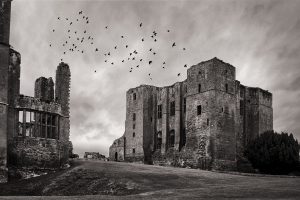 BARNES: My original conception of the series was to infuse it with Gothic horror leanings, drawing upon some of my literary interests, but as I developed the characters in the pilot script – and as the other writers brought their ideas to the table – it was the humour that came to the forefront. Essentially, I just wrote what I personally thought was funny: obsessives who cause their own problems and can’t see it, being repressed when everyone else is a libertine, a touch of mild surrealism and perversity. There’s a dark thread running through it all, of course, which arises from the subject matter, but I try not to push it too much. It’s meant to be inherently enjoyable, not gross people out. I also like to avoid vulgarity and swearing, partly to increase the potential listenership but also because it forces more interesting uses of character, language and rhythm.
BARNES: My original conception of the series was to infuse it with Gothic horror leanings, drawing upon some of my literary interests, but as I developed the characters in the pilot script – and as the other writers brought their ideas to the table – it was the humour that came to the forefront. Essentially, I just wrote what I personally thought was funny: obsessives who cause their own problems and can’t see it, being repressed when everyone else is a libertine, a touch of mild surrealism and perversity. There’s a dark thread running through it all, of course, which arises from the subject matter, but I try not to push it too much. It’s meant to be inherently enjoyable, not gross people out. I also like to avoid vulgarity and swearing, partly to increase the potential listenership but also because it forces more interesting uses of character, language and rhythm.
I’ve seen the series compared to Fawlty Towers, Blackadder, Father Ted, Keeping Up Appearances, and so on, mainly as it’s a British sitcom and those are some of the closest references (especially to an American listenership), which is immensely flattering. My own radio / TV influences are in fact somewhat older – Hancock’s Half Hour and Steptoe and Son are the ones I mention most – though also take in literature (Wodehouse) and theatre (Alan Ayckbourn). Ayckbourn in particular wrote tremendous roles for women and his great work in that regard always goes under-reported. But the other writers for Season One –- and now for Season Two -– will bring their own influences to bear, and then my directors and the actors will shape it all themselves and provide a consistent tone.
TRENCH: The readthroughs. I’ve worked with David and I’m familiar with his work and Overcoats is very him. He knows the rhythms needed in a scene to build up to a joke. I remember in early drafts he’d talk about putting in a placeholder joke until he came up with something better while he retooled the actual story around it but he knew instinctively where the joke had to be and the scene scaffolding that needed to go around it. I did a play with David once that had a gag in it that required someone overfilling a cup of tea. He spent hours experimenting with cups and muttering lines to himself to find the exact length of line that would work after putting in the stage direction. That’s the Barnes touch.
Beth, Ciara and I found during recordings that a house style emerged in performance. When we’re outside Funn Funerals or outsiders come in, the focus is on the characters who don’t work for the business. Every character is big and funny and ours become vehicles for their comedy. Any time the Mayor steps in, for instance, everyone becomes the straight man to him because he has the absolute highest status (and his insecurity in that status brings the comedy). But when it was just the three of us in the parlour, we found a sort of manic energy — like being constantly at Red Alert on the Enterprise — that worked for us. We really love doing those scenes. The character who breaks that boundary is Eric. Because he’s the antagonist, he can never quite be one of us but on the other hand he’s frequently the sensible audience lens for us so becomes the straight man against the Funns. A lot of the comedy comes from us assuming the higher status against Eric then being undermined by reality — except for in the Eric/Georgie storyline which has its own dynamic that gives Eric the punchlines.
CHAMPION: Are these mini-episodes your effort to show the audience where you intend to shift towards?
BARNES: Not really. They’re opportunities to experiment with form and expand upon our secondary characters, which helps us to develop their role in the main series. Rosie Fletcher’s “Random Mouse” was written to be an entertaining way to essentially trail Season Two; “Agatha Doyle and the Honey Trap” is a lighthearted Christie-style mystery by Tom Crowley; and “The Casebook of Dr. Edgware” by Tom and myself provides a new perspective on Season One from the viewpoint of a character who only originally had one line of dialogue. The ones we have coming up are entirely different too. But Season Two will continue the style and tone that we created in Season One, whilst taking the stories in a new direction.
CHAMPION: What input have the actors had on where you’re moving towards stylistically? Or is this really something that comes about naturally when you assemble a large cast of characters?
TRENCH: David has suggested I answer this one because he’s being even handed about breaking up the questions. Which is very lovely of him and I haven’t a clue. He told me the other day he now writes Rudyard with my voice in mind so with any luck I’ll be considered for the part if we do Season 2.
CHAMPION: Also, I listened to an Audio Drama Production Podcast interview with David and John Wakefield where the two of you described being very committed to homemade foley. How early in the production did you have the FX in place? I’m especially curious about the timing of Madeleine’s squeaks, which always seem to punctuate the right moments and remind us that we are in a comic environment. The squeaks also tend to soften some of the more unusual premises, weirdly rooting the narrative into something that’s real. The squeaks almost feel like something on a score sheet. At the risk of outing myself as a sonic obsessive type, I have to ask about the squeaks! How many do you have? Did you time them in the script? To what degree did you mess with the squeaks in post? Did the squeaks ever save your ass on a flub?
BARNES: They are indeed all script; Madeleine insisted on that. She’s a true professional, providing us with vocals that could run the full emotional gamut that a mouse can reach. It’s very difficult to find talent like that. After lengthy negotiation, she’s agreed to come back for Season Two, and the production team is immensely grateful. We wouldn’t know what to do without her.
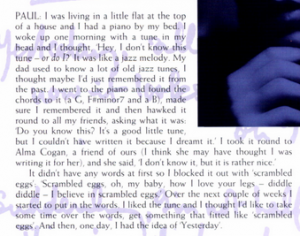 CHAMPION: Well, David may be a fair-minded gentleman, but I’m not going to let him get away from unpacking this point! Does the concern for status, which I feel is a staple of good drama, emerge as much in the act of production as in the writing, even when you have a large character such as the Mayor? Or is this as rigorously planned as David’s inherent fixation upon timing? David’s placeholder jokes remind me of how Paul McCartney had “Scrambled Eggs” in place of “Yesterday” as he was still working out the lyrics for that now classic song (with the “Scrambled Eggs” version later performed decades later in a newly enhanced form with Jimmy Fallon). This may simply be the approach of a highly obsessive mind, for which I have nothing less than the most heartfelt appreciation for, but I am very curious how David contends with the vast unknown story element, perhaps an invisible territory of pages going well beyond overfilling a cup of tea! David, do you feel that story sorts itself out easier than specific lines?
CHAMPION: Well, David may be a fair-minded gentleman, but I’m not going to let him get away from unpacking this point! Does the concern for status, which I feel is a staple of good drama, emerge as much in the act of production as in the writing, even when you have a large character such as the Mayor? Or is this as rigorously planned as David’s inherent fixation upon timing? David’s placeholder jokes remind me of how Paul McCartney had “Scrambled Eggs” in place of “Yesterday” as he was still working out the lyrics for that now classic song (with the “Scrambled Eggs” version later performed decades later in a newly enhanced form with Jimmy Fallon). This may simply be the approach of a highly obsessive mind, for which I have nothing less than the most heartfelt appreciation for, but I am very curious how David contends with the vast unknown story element, perhaps an invisible territory of pages going well beyond overfilling a cup of tea! David, do you feel that story sorts itself out easier than specific lines?
BARNES: There’s the old story about [Billy] Wilder and [I.A.L.] Diamond spending ages trying to come up with a decent last line for Some Like It Hot and ultimately going with their placeholder gag because they couldn’t think of anything better, and now of course that line is one of the most famous in movie history. But of course it’s not a line that sings out of context; entire plot threads have been leading up to it, and it’s an immensely satisfying — and very, very funny =- capstone.
On the other side, writers can come up with an absolute zinger of a line and then tie themselves into knots trying to make their story support it, and typically that line will be one of the first to get cut by a decent editor. The best dialogue is the dialogue that fits the situation you’ve created.
Every writer has sat down at some point and just started writing dialogue without an actual purpose, and it’ll typically go nowhere and not be very good. It’s easier to sort out dialogue than a story, because plotting is torturous, but I think it’s nearly impossible to sort out good dialogue if you haven’t sorted out the story first. And then your story might change in the writing of the dialogue, which is great too. Switching destinations is fine, but you ought to have at least one in mind when you set out.
CHAMPION: Might this also account for the island’s vast tableau? Do the other writers serve as relief pitchers for your vivacious baseball game on this front?
BARNES: I feared when I wrote “The Bane of Rudyard” that we might exhaust the story potential within a few episodes, but then the other writers showed me that, yes, there was much more you could do with this set-up. I took a lot of inspiration during that first writers’ meeting, where my job was essentially to ask “What excites you about all this?” and then decide which answers inspired me the most. For both seasons, I’ve found it easiest to help the other writers develop their stories first and then formulate my own in response, but I begin with some firm ideas about what I want the series to do, to say and to explore, and I’m OK with telling a writer, “I’m not wild about this idea, can we do something else?” But then, all of the writers have come to the table with at least one idea I’ve adored instantly, and those ideas get developed into full episodes.
CHAMPION: What’s the biggest mistake you made in Season 1?
BARNES: Owing to busy schedules. the episodes were edited concurrently with release dates, which led to a lot of pressure and sleepless nights for all involved. The sound design is very involved and Andy and John require a lot of time to do their magic. We’ve sorted this out for Season Two. But remember: always allow for more time than you think you need.
CHAMPION: What’s the most extraordinary thing that you had to do to get an actor on board Wooden Overcoats?
BARNES: Character comedian and attractive man Kieran Hodgson was lured to the studio with the promise of sparkling dialogue. Instead he was placed before a microphone and told to moan orgasmically in French whilst we scrutinised him thoroughly for about forty-five minutes. He’s since gone on in other productions to speak whole lines of actual dialogue, albeit for far more disreputable companies such as the BBC.
CHAMPION: What’s the greatest piece of advice you could offer to any emerging audio drama producer?
TRENCH: Be professional. Be original. Be ambitious. Sorry, that’s three but I think they’re all very important.
Professional means treating every aspect of your production with equal importance. Strive to work with new people and strive to create opportunities. As soon as you position yourself as someone making a thing, you enter a world with thousands of unheard voices who maybe don’t have the luxury of your ear so make it easy for them to find you and work with you. It also means learning about what came before and positioning yourself within that. Listen to as much as you can, not just drama podcasts, from as many different countries.
I say original because I’m seeing a lot of very good audio drama coming out in similar areas of storytelling. There’s a leaning towards genre and faux-documentary — maybe the Night Vale and Serial influences. I think a canny producer would ask themselves what they can do to separate themselves from the trend. A police procedural? A period piece? I’d listen to a Western. It also means thinking about what you can do with the medium. Beef & Dairy Network and The Bright Sessions are great examples of being playful with the fact that, at the end of the day, a podcast is just a sound file. Two examples from recent(ish) years on the radio: have a listen to Continuity, which was Alistair McGowan as a radio continuity announcer having a breakdown on air between fake trailers parodying Radio 4 formats, and Warhorses of Letters by Marie Phillips and Robert Hudson which was an exchange of love letters between Napoleon and Wellington’s horses.
And ambitious is the fun one. We can do anything in audio drama so… do. Submarine scrap yard? Two enzymes chatting while they ferment grapes? The parliament of the birds? I want to hear these worlds. What can you do that would require a massive time and money budget on telly? And what can you do that’s not been done in other media? Equally, be ambitious in how you make it. Look for great studios, look for unusual recording spaces, see how many countries you can get people involved in one project… there’s more (and more immediate) scope for us in this medium than any other I can think of so use that advantage to the full.
